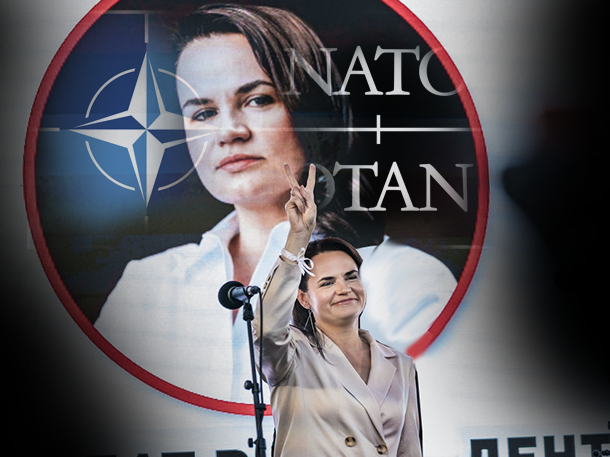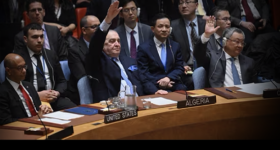
Recent events in Belarus appear to have been designed to moved NATO’s ever-expanding eastern front even closer towards Moscow.
EU bureaucrats, along with Washington’s change agent in the region, the notorious German Marshall Fund, are attempting to push the situation in Belarus deeper into the familiar ‘Color Revolution’ impasse, towards street violence and evenual ‘regime change,’ with the ultimate aim of installing a pro-US and pro-EU leader.
Following its recent Presidential elections, western leaders have called on Belarussian President Alexander Lukashenko to step down and make way for the US-backed candidate who lost the recent election, Svetlana Tsikhanovskaya, claiming that the election was ‘unfair’ and that Belarussian authorities must ‘stop the repression against the Belarus people’ and ‘open a dialogue with civil society.’
Tsikhanovskaya is already forming her own western-backed ‘government in exile’ which will eventually be recognized by Washington and its allies as the “legitimate leader and government” of Belarus. This follows the familiar ‘humanitarian intervention’ template which the US has laid out for targeted countries like Libya, Syria, Ukraine, and most recently for Venezuela.
SEE ASO: Uncovering Faces Of Belarusian Opposition
While this western-driven campaign to remove what Washington believes is a “pro-Russian” leader in Lukashenko, the reality of the subterfuge is much deeper and more profound in terms of its geopolitical significance. No, this is much more than your typical western-backed color revolution. Upon closer examination of Tsikhanovskaya’s own manifesto, it’s clear that this latest regime change effort is not merely to pull Belarus away from close and friendly relations with its neighbor Russian – but rather it’s about forcing the country towards binding partnerships with both NATO and the EU.
In her new coalition’s policy manifesto drafted together with two other former candidates assistance of Victor Babariko and Valery Tsepkalo, Tsikhanovskaya is effectively calling for the complete dismantling of the Belarusian government, its military, and economic structures – in order to realign the country with its new western political, financial and corporate partners.
In terms of antagonizing Russia, Washington and Brussels are now playing one of their boldest hands yet.
South Front reports…
Before being taken down, the election campaign website of Belarus Presidential candidate Svetlana Tsikhanovskaya had an entire program for the future development of Belarus as a country.
In a relatively hidden section, it has a section named “National Policy” which reveals the opposition’s plan for Belarus eventual entry into NATO and the EU.
The website has since been taken down; however, it can still be found on web archive.
“I am a presidential candidate Svetlana Tsikhanovskaya and this is my letter to all citizens of Belarus.
I am 37 years old. She was born in Polesie. Graduated from the philological faculty of the Mozyr Pedagogical University. I am fluent in Belarusian, Russian and English.
A year ago, my husband Sergei Tikhanovsky created his own project “Country for Life” and went to Belarus. Sergey gave people the opportunity to speak up. They talked about what worries them, what they feel, what they think about Belarus. People talked about their difficult life and dreamed of living in a free and rich country.
I was amazed at how scared the authorities were. People began to be threatened, fired from their jobs, and thrown into prisons. It turned out that the opportunity to speak out can wake up society.
When Sergei was deprived of the opportunity to participate in the elections, having unjustly accused and arrested him, I decided to replace him and go to victory. For myself, for my husband, for all of us, for our children. As a wife, as a mother, I understand that in a family one for all and all for one. I want it to be the same in our country.”
That’s how it begins, then moves on to what she would like for Belarus to become in the future.
I want to become the President of the Republic of Belarus, but not for the sake of a position, but in order to return you the right to choose.
We are building a country not only for ourselves, but also for our children.
I want our children to receive a good education, medical care, so that they can find a good job, start a family and have their own home. So that they stay to live here, on their land, and not want to leave in search of a freer and more just country.
I want us to feel love and respect for ourselves, have the right to choose and be proud of our country to live in.
I want Belarus to be respected in the world, so that we look for friends, not enemies.
I want to see the vile tradition of persecuting people for the truth become a thing of the past.”
Then she looks into the National Policy which was constructed with the assistance of Victor Babariko and Valery Tsepkalo, as well as “the best experts, parties and public organizations.”
Babariko and Tsepkalo had a website, which contained the National Policy, but it appears to be gone now – reformby.com, it is available on Web Archive. Tsikhanovskaya linked the website in her campaign website – essentially the National Policy wasn’t even part of her own campaign, but a link to an outside, third party website, as it was likely made by individuals outside of her campaign party.

The main directions of reforming the existing state policy are: withdrawal from integration associations with the participation of Russia; preservation and development of the national cultural heritage, the Belarusian language; sustainable economic growth; high level and quality of life of citizens; democratic system of government.
Below are the issues that the improved national security needs to deal with:
- Aggressive foreign policy of the Kremlin.
To implement its revisionist, imperial plans, the Kremlin is actively using:
- economic and energy blackmail,
- information pressure,
- spreading fake news and misinformation,
- toxic effects on the elite and society,
- falsification of history in order to manipulate the public consciousness,
- artificial provocation and incitement of internal conflicts.
The Russian leadership is using the concept of “Russian peace” to strengthen Moscow’s control over Belarus. The basis for this is often the Russian language and the Russian Orthodox Church.
The Kremlin is actively using soft power methods: NGOs, thought factories, the media, bloggers, social networks, exchanges and internships in Russia.
- Lack of democracy, freedom of speech, freedom of assembly and other basic freedoms.
Independent media is under severe pressure. Civil society and the political opposition face severe restrictions on their activities and persecution. There have been no free and fair elections in the country for more than two decades.
- Low level of national consciousness and dominance of the Russian language.
The complete inability of state ideologues and state media to compete with the propaganda of the Russian media: Russian television and radio actually dominate the information field of Belarus.
- The problematic state of the Belarusian economy.
The Belarusian economy is facing significant depreciation of fixed assets and technological backwardness not only from world leaders but also from its neighbors – the EU.
- Membership of Belarus in integration supranational entities, dominated by Russia – the Union State, the CSTO, the EurAsEC, the CIS.
As part of the CSTO, Belarusians are threatened with involvement in armed conflicts in Central Asia and around the world. Through participation in the CSTO, there is a threat of the use of Asian or Russian troops in our territory. Belonging to the CSTO also hinders the modernization of the army.
- Changing priorities and emphases in the foreign policy of the European Union.
The EU is facing unprecedented migration challenges and the consequences of Brexit. Many EU countries are looking for compromises with the Kremlin.
The United States is not a real guarantor of Belarus ‘independence, despite progress in bilateral relations and Washington’s firm commitment to Belarus’ independence and sovereignty.
Following are the main goals and objectives of the reform:
The main goal of reforming the national security sector is the immediate mobilization and consolidation of society in order to protect independence and sovereignty.
Tasks:
- strengthening national identity, increasing patriotism and national dignity;
- unification of society on the basis of democratic values and the idea of building an independent Belarus;
- reduction of the Kremlin’s influence on Belarus through informational, economic, integration and humanitarian factors;
- withdrawal from post-Soviet integration associations dominated by Russia;
- integration into Western political, economic and military structures (EU, NATO).
This will all be implemented with the following steps:
- In the political sphere:
- withdrawal from the “Union State”, the Eurasian Union, the Customs Union and other integration entities dominated by Russia;
- banning pro-Russian organizations whose activities run counter to national interests, as well as Russian foundations and organizations that fund such structures;
- criminalization of public statements challenging the existence of a separate Belarusian nation and / or its historical right to its own state. Introduction of criminal liability for public insults to the Belarusian language;
- monitoring by civil society forces of pro-Kremlin initiatives in Belarus;
- border and customs control on the border with Russia.
- Prohibition on sale of Belarusian infrastructure facilities to Russian companies.
- In the information sphere:
- liberation of independent media from state pressure and control, ensuring media freedom and freedom of speech in Belarus;
- ban on broadcasting journalistic socio-political and news programs created by Russian TV channels in Belarus;
- inclusion in the standard TV package of mandatory public TV channels of Latvia, Lithuania, Poland, Ukraine;
- resumption of permanent activities of the Public Coordinating Council in the field of mass media.
- In the military sphere:
- withdrawal from the CSTO, return of full control of Belarus over its own air and missile defense systems;
- withdrawal from the territory of Belarus of Russian military facilities – a communication center in Vileyka and a radar station near Baranovichi;
- expansion of patriotic education in the Belarusian army;
- translation of educational work in the army into Belarusian;
- development of border infrastructure at the borders with EU countries, increasing the capacity of border crossings.
- In the environmental sphere:
- ban on commissioning and closure of new harmful industries in Brest, Mogilev, Svetlogorsk;
- publication of comprehensive truthful information on the construction, safety and operation of the Astravets NPP;
- holding a broad public discussion on the fate of the Astravets NPP.
- In the social sphere:
- raising wages and improving the working conditions of health and education workers.
- In the cultural sphere:
-
- popularization of national heroes with a bias in the XIX and XX centuries;
- popularization of Kastus Kalinouski as a political founder of the modern Belarusian nation, as a symbol of the struggle of Belarusians for freedom and independence and as a figure that should consolidate around all those committed to the values of national revival and independence.
These steps generally need to be fulfilled by 2025 and 2030 respectively, when the plan is for Belarus to finally enter NATO and the EU.
The plan by 2030 also includes strengthening cooperation and formation of strategic partnership within the Baltic-Black Sea community, formation and organizational design of the relevant regional intergovernmental bloc.
Additionally, diversifying energy supplies by 2030 is also important: a limit on the share of suppliers in any of the countries to a maximum of 30% of total energy imports. This is specifically aimed against Russia, but is obviously not achievable in the very-short term, that is why it is not mentioned in the immediate steps to be taken.
Naturally, Tsikhanovskaya would also need outside help, and she issued an appeal to the European Council for assistance.
Summing up the plans and actions of the Belarusian ‘opposition’, it becomes evident that its main goal is to seize power with the support of Western backers by any means and then just turn Belarus into Ukraine 2.0. The Belarus sovereignty, economy and interests of Belarusian citizens will be sacrificed for the interests of a small group of Western-funded ‘activists’ and ‘politicians’ and the country will be sold off to Euro-Atlantic structures.
***
READ MORE BELARUS NEWS AT: 21st Century Wire Belarus Files
SUPPORT OUR INDEPENDENT MEDIA PLATFORM – BECOME A MEMBER @21WIRE.TV















